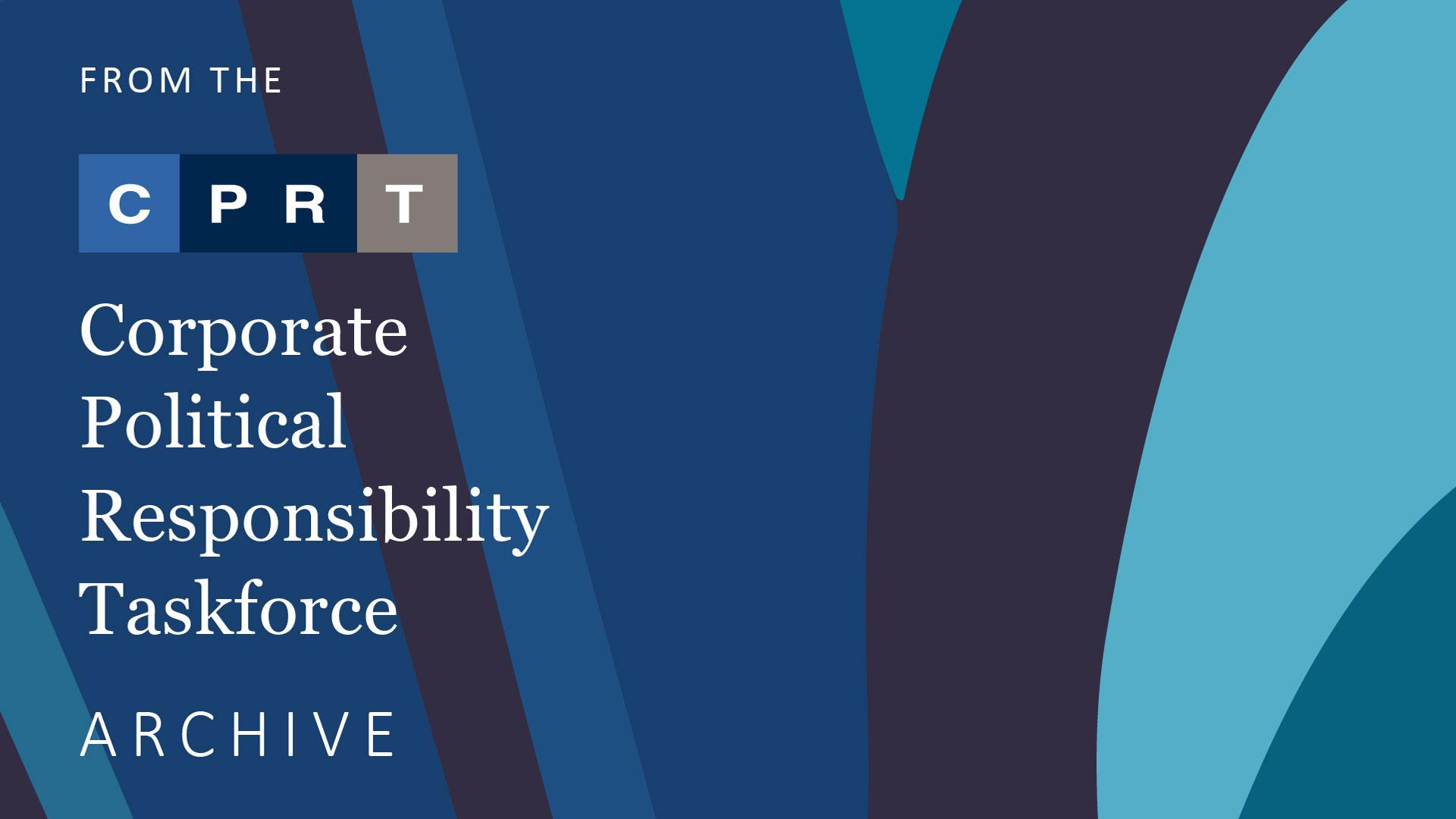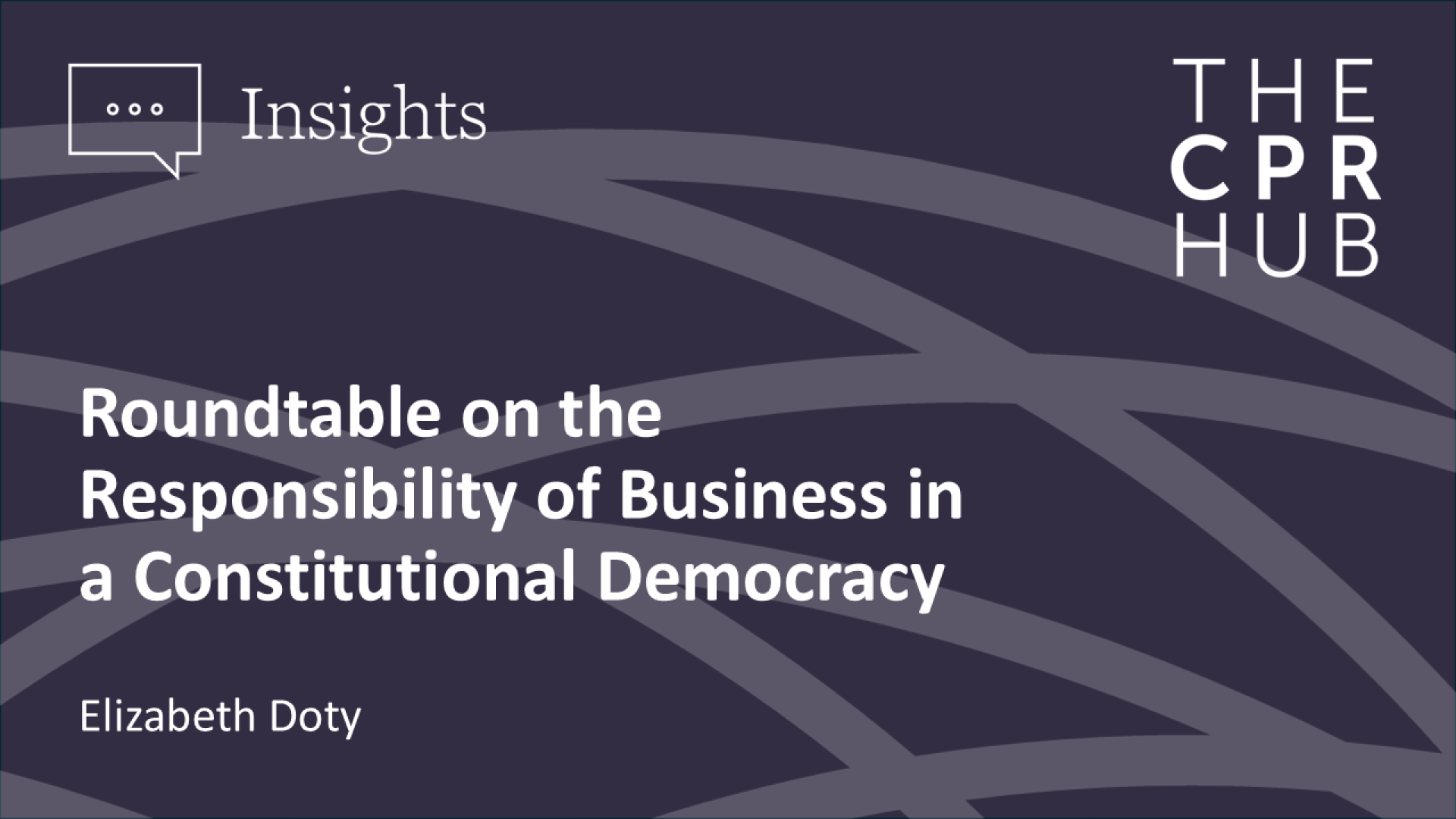Receive Updates from The CPR Hub
Learn about new tools, insights and events to help you consider how CPR can help your company, clients or members.









This report argues that to meet the demands of democracy, government must be reorganized to effectively carry out the goals set by the people’s representatives, and offers a four-part agenda to rebuild state capacity through hiring reform, procedural streamlining, digital modernization, and stronger feedback systems.
The White House AI portal lays out a a multi-pronged national strategy to boost U.S. leadership in AI by investing in research, encouraging adoption across industries, and preparing the workforce for AI-driven changes. It highlights a commitment to developing AI responsibly by setting ethical guidelines, ensuring transparency and privacy, and fostering cooperation across government agencies to address risks and build public trust.
This report identifies 10 top geopolitical risks that could significantly affect companies and markets: (1) global trade protectionism, (2) Middle East regional war, (3) U.S.-China strategic competition, (4) global technology decoupling, (5) major cyber attacks, (6) major terror attacks, (7) Russia-NATO conflict, (8) emerging markets political crisis, (9) North Korea conflict, and (10) European fragmentation. For each risk, the report highlights three assets most sensitive to that scenario—such as sector-specific equities, currencies, credit spreads, or commodities—offering concrete signals businesses can monitor to assess potential impact. This framework helps firms proactively track and integrate geopolitical risk into strategic planning and risk management.
Bloomberg’s new Geopolitical Risk Scores offer a data-driven way for companies to assess how country-level political instability—such as regulatory disruption and civil unrest—could affect operations, supply chains, and compliance. Built with Seerist threat intelligence and covering 7 million companies across 245 countries, the scores quantify 29 types of political, security, and cyber risk. Companies can track, compare, and integrate these risks into strategic planning, disclosure, and portfolio management.
The article explains that capitalism and open markets can strengthen democracy by fostering pluralism, competition, and opportunities for independent groups to operate outside government control. It argues the bigger risk is when governments capture businesses through regulation, which reduces that independence and weakens democracy.
To rebuild election trust among conservative voters, this Johns Hopkins–R Street tool outlines three actionable principles: affirm past election integrity, increase process transparency, and improve election operations. It pairs these with Gallup-backed data to guide civic leaders—including business—on addressing doubts without heightening polarization.
Paul Rosenburg interviews James Fishkin, the Janet M. Peck Chair in International Communication at Stanford University where he is Professor of Communication, Professor of Political Science (by courtesy) and Director of the Deliberative Democracy Lab. Fishkin recounts a wide range of real-world deliberation experiments—including on energy and climate—that achieved policy progress by integrating representative citizen groups, expert input, and structured facilitation. The interview outlines the design conditions for those breakthroughs, which can be a source of best practices for civil society organizations, and potentially, companies.
Recognizing that climate-related risks are complicated, this brief disaggregates climate risks into three categories (planetary, economic, and financial) to then map those risks to which stakeholders are best positioned to address them. The article explains the importance of this disaggregation to facilitate intended outcomes and avoid unintended consequence.
Resources for the Future's new series, If/Then, focuses on providing rapid, independent economic insights on the consequences of policy choices, drawing from both new and prior research. In a highly polarized environment, it aims to fill critical information gaps by making credible evidence accessible in real time to policymakers, businesses, and stakeholders navigating fast-moving debates.
This publication frames AI safety as a critical global public good, highlighting challenges in balancing innovation with robust safety measures, ensuring international cooperation, and promoting equity so AI benefits align with sustainable development goals. It calls for clear accountability alongside shared responsibility through collaborative governance to manage AI risks worldwide
This article presents a framework leaders can use to better focus their sustainability strategies. It consists of four lenses: the business value lens (What affects our bottom line?), the stakeholder influence lens (What are people trying to tell us?), the science and technology lens (What does the data tell us about our impact and future?), and the purpose lens (What do we stand for?). The framework is intended to help leaders balance external pressures with internal priorities and objective data with stakeholder perceptions.
This piece explores how companies can maintain ethical business practices as geopolitical tensions and authoritarianism erode global consensus on anti-corruption and rule of law. The authors argue that compliance systems alone are insufficient and call for stronger values-driven leadership, cross-border ethical alignment, and proactive stakeholder engagement to navigate growing political and moral complexity.
Addresses the increasing role that political turbulence is having on corporations’ ability to accomplish strategic objectives and tips for navigating external political uncertainty.
Eccles draws on a survey of 884 sustainability experts in 72 countries, which finds that NGOs’ go-to tactics—such as boycotts, litigation, and public shaming—are seen as low-impact and risk fueling backlash. It points instead to higher-leverage strategies like policy advocacy, education, and constructive engagement with skeptics as more effective paths forward.
Authored by the Energy Transitions Commission, representing a wide array of perspectives, this report proposes a pathway to a net-zero global economy by mid-century. Specifically, it outlines three priorities for the 2020s: scaling proven zero-carbon solutions, creating supportive policy and investment environments, and advancing next-generation technologies for hard-to-abate sectors. It emphasizes practical actions for governments, investors, and businesses and stresses global collaboration to meet climate targets.
This article argues that Modern Portfolio Theory falls short in today’s interconnected and complex risk landscape, calling for “system-level investing” that integrates social, environmental, and economic factors to boost long-term resilience and sustainability.
Dominic Barton, Mark Wiseman, Laurence Fink, Richard Edelman, Henry M. Paulson Jr., Lynn Forester de Rothschild, Nicholas Carr, Nitin Nohria, Paul Polman, Whitney MacMillan, Greg Page, Chanda Kochhar, Kathleen McLaughlin, Doug McMillon, Adrian Orr, John D. Rogers, Lim Chow Kiat, Euan Munro, Charles Tilley, Lei Zhang, Michael Sabia, James P. Gorman, David Walker, Angel Gurría, Ronald P. O’Hanley, Donald Kaberuka, Julie Hembrock Daum, Edward Speed, Angelien Kemna
This report compiles insights from CEOs, investors, and regulators emphasizing how quarterly earnings pressure and misaligned incentives restrict long-term strategic thinking, and it proposes governance reforms to realign business purpose with sustainable, multi-stakeholder value creation.
This study examines the global trend toward populism from 1900 to 2020 and its long-term economic impact. It finds that countries under populist leadership experience a 10% lower GDP per capita after 15 years compared to a plausible non-populist counterfactual, linking populist governance to economic instability, weakened institutions, and heightened risks for businesses and investors.
This piece proposes that trade associations are positioned to be powerful groundbreakers for business—helping shape rules that enable long-term value and healthy competition. But without clear standards, the authors argue, these same associations risk acting as bodyguards for narrow interests, distorting markets, block innovation and undermining trust in business and government. This piece proposes applying CPR principles—Legitimacy, Transparency, Accountability, and Responsibility—to guide more consistent, credible association advocacy aligned with shared business and societal goals, and the ultimate promise of free markets.
Based on the fact that the assumption that business and politics can and even should be kept separate is no longer realistic, the authors outline steps that effective leaders should take to ensure strategic decisions in the space, which include: (1) develop robust principles to guide strategic choices; (2) address ethical issues early; (3) consistently communicate and implement their choices; (4) engage with and beyond the industry to shape the context; and (5) learn from mistakes to make better choices in the future.
This paper shows how applying fiduciary duty to investors can bridge the gap to common-sense climate action by helping overcome the collective action problem that often slows climate-aligned investment. By recognizing climate and nature risks as financially material, investors can shift from passive market participants to active actors in the clean economy transition, reducing systemic risks and aligning portfolios with long-term climate goals
The Capitals Coalition is a global network that helps businesses recognize how their success is directly or indirectly supported by natural, social, and human capital—like clean air, skilled workers, and public trust. It offers practical frameworks, case studies, and tools to help companies measure, value, and better manage these dependencies for more sustainable, informed decisions.
This article presents data on structural shifts in U.S. markets over the past two decades, showing how rising concentration moves returns from labor to capital, reduces competition, and limits investment. It distinguishes “good” concentration, driven by efficiency and innovation, from “bad” concentration, driven by rent-seeking. These market changes also influence political trends and policymaking, highlighting the broader economic and governance implications of concentrated industries.
Comments from business leaders, academics, civil society organizations and others commenting how the Erb Principles for Corporate Political Responsibility can help with managing risk, sustaining market economies, strengthening civic institutions and enabling long-term value for business and society.
The Grand Bargain Project finds that Americans across party lines identify the same six priorities—economic opportunity, education, healthcare, national debt, clean energy, and tax reform—as critical, with surveys showing over 90% agreement on their importance. Even more encouraging, when comparing the status quo to a shared package of 35 reforms, 77% preferred the reforms. These results point to rare cross-partisan convergence on both the problems and potential solutions, and a possible place for constructive engagement.
Based on interviews with more than 23,000 citizens across 31 countries, Ipsos finds persistent public distrust in elites, globalization, and economic systems—driving polarization across both advanced and emerging economies. These trends underscore the need for companies to account for public sentiment and political division when shaping public affairs strategies and stakeholder engagement, especially in regions where legitimacy and trust are increasingly strained.
Joe Zammit‑Lucia argues that in today’s world, politics and business are deeply connected, and companies need strong “political antennae”—a keen understanding of societal values, regulations, and consumer expectations—to succeed. Drawing on global case studies, he shows how pressures from stakeholders, investors, and regulators require firms to embed political awareness into their purpose, strategy, and daily operations to build trust and resilience.
This report examines the economics of action and inaction on climate, energy and the environment, and finds that failing to limit global warming to below 2°C could reduce cumulative global GDP by 15% to 34% by 2100. Conversely, the analysis suggested that investing 1% to 2% of global GDP in mitigation and adaptation efforts would significantly reduce these economic damages. They conclude that the net cost of inaction—climate change impacts minus the cost of action—is estimated at 11% to 27% of cumulative GDP, underscoring the economic imperative for proactive climate and energy strategies.
This article examines how past negotiations, or precedents, shape current negotiations by guiding strategy and providing tested solutions, while also potentially constraining new thinking. It offers practical insights for managers on how to create, apply, and navigate precedents effectively to influence outcomes.
This nonpartisan initiative aims to translate publicly available government data into clear, accessible insights on a variety of topics, including the economy, health, education, and government spending. By presenting information without spin, it aims to empower citizens, policymakers, and businesses to form their own conclusions, supporting the “third side” in polarized debates.
Learn about new tools, insights and events to help you consider how CPR can help your company, clients or members.
